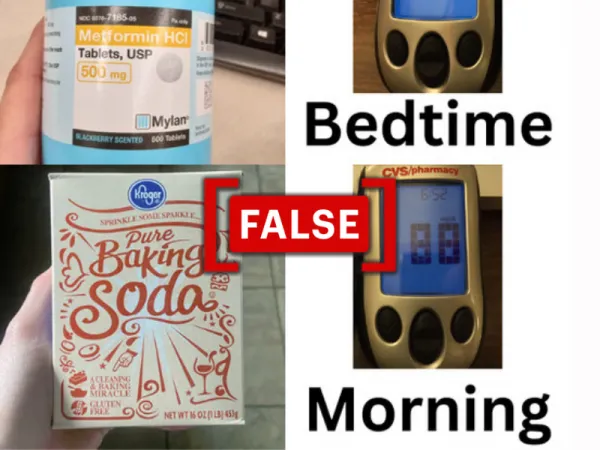By: Julia Vella
August 8 2024
 Baking Soda Myth, Edited by LogicallyFacts
Baking Soda Myth, Edited by LogicallyFacts
Baking soda cannot replace Metformin to treat type 2 diabetes.
Context
A post circulating on Facebook with close to 15,000 views falsely claims that baking soda can be used to replace Metformin, a medicine used to treat patients with type 2 diabetes. The user describes how "After 6 years of uncontrollable blood sugar, my husband hit 60 and finally threw away his Metformin last month!" It goes on to make vague references to an "easy routine" and urges people to "watch the same video we did before it gets taken down."
Although the post does not specify the routine details, it heavily implies that baking soda is the remedy by comparing Metformin and a blood sugar reading with baking soda and a much lower blood sugar reading.
However, baking soda cannot lower blood sugar and is not an effective diabetes treatment.
In fact
Type 2 diabetes is a medical condition that causes the body not to produce enough insulin in the body or to produce an amount that does not function as it should. Insulin is a hormone produced within the pancreas to regulate blood sugar levels, ensuring a healthy range. Therefore, patients who have type 2 diabetes have very high blood sugar levels (hyperglycemia) that result in symptoms like fatigue, unnaturally high thirst levels, blurry vision, and slow-healing wounds. Untreated diabetes could cause significant health complications, particularly with nerves, eyes, and feet.
Metformin is usually prescribed to type 2 diabetic patients who have not shown sufficient positive response to the usual recommendations of diet improvement and an increase in exercise. The medication lowers insulin and, therefore, blood sugar levels within our blood by decreasing the amount of glucose absorbed from consumed food and drink, reducing the glucose produced by the liver, and aiding the body in using its insulin better.
The Facebook post suggests baking soda can be used instead of Metformin to treat diabetic patients. Baking soda has been previously researched in the context of diabetes and has been effective in treating diabetic ketoacidosis (DKA), a severe complication that may cause an alarming lack of insulin in the blood.
DKA occurs when the body is unable to use sugar for energy and, therefore, starts to use fat, producing chemicals called ketones. If ketones build up, they can make the blood acidic, a condition known as acidosis. Research on animals has shown that baking soda can aid in preventing mucormycosis, a rare infection that occurs in subjects with DKA that affects the lungs or sinuses.
This is the only research on any association between baking soda and diabetes. As previously stated, it has only been tested on animals (mice) and was explicitly studied to treat this rare infection only in subjects with DKA. Contrary to the Facebook post's suggestion, it is not a diabetes treatment. There is a lack of research on humans and insufficient evidence to support the self-treatment of infections with baking soda.
Baking soda has been shown to help several other ailments, such as reducing heartburn and relieving indigestion, and may also reduce muscle fatigue. However, if conditions persist, it is always recommended to see a doctor, as at-home remedies are not long-term treatments or cures.
The verdict
Baking soda cannot lower blood sugar and is not an effective diabetes treatment. The only research that connects baking soda and diabetes is related to diabetic ketoacidosis, a complication that can occur because of diabetes. Therefore, we have marked this claim as false.